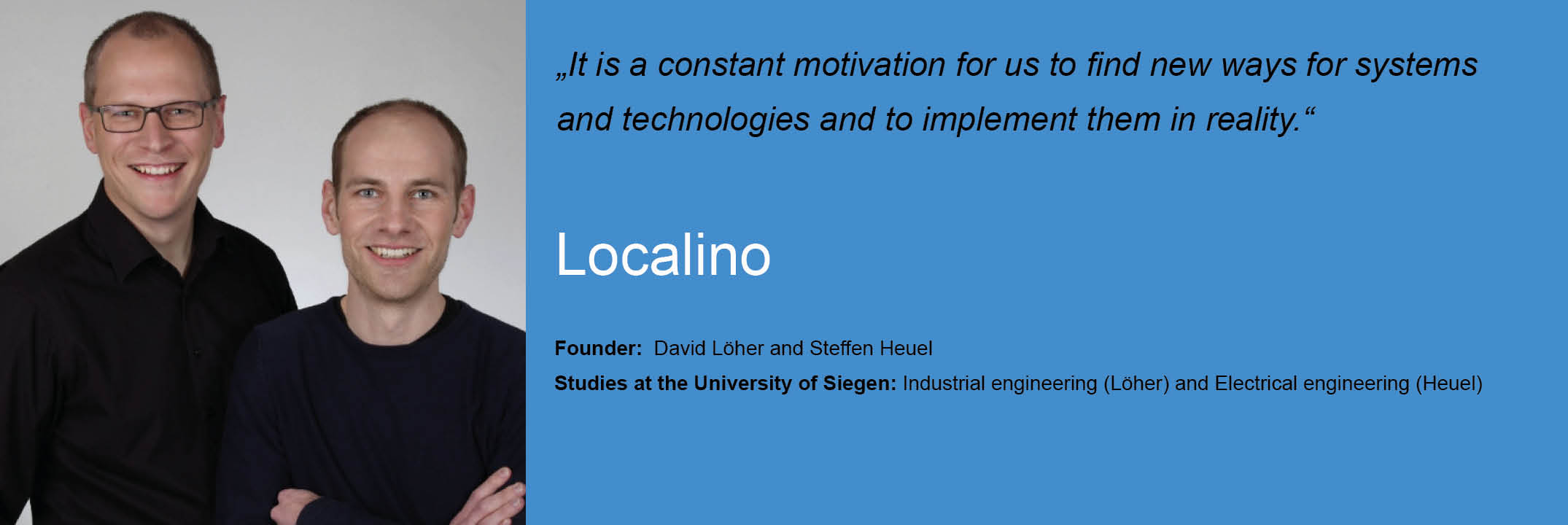Localino
Six years ago, friends David Löher and Steffen Heuel, who had been classmates, founded the company Localino together. During their studies, they initially went their separate ways, which now perfectly complements their core competencies. As an electrical engineer, Heuel focuses on developing new products, while David Löher, a graduate industrial engineer, takes care of all customer and project requirements.
Localino is about tracking vehicles, people, and objects, as well as digitizing processes. The company is based in Lennestadt and now has a core team of 12 employees.

How did you come up with the idea for "Localino"?
The idea originated from the retail sector, which asked the question: what exactly is our customer doing in our furniture store and where is he spending how much time? And above all, can't these data be recorded automatically and digitally?
Steffen and I then came up with the idea of providing the functions known from outdoor street tracking with suitable technology inside buildings. These technologies are summarized under the term indoor localization. That was the catalyst for Localino.
In which areas can Localino be used?
Many of our customers come from the production and logistics sector, where, among other things, the digital recording of goods flows, process automation, and human-machine interactions are important. But Localino is also used in the healthcare sector. Hospitals and nursing homes are becoming increasingly digital. Here, the goal is to minimize search efforts, navigate people, or provide emergency call functions. Another area of application is agriculture, where we are thinking about what the intelligent cowshed of the future might look like. In addition to indoor localization, Localino is also used outdoors to track vehicles, manage areas, and control goods flows.
How does your idea help in combating/mitigating the pandemic?
In the past year of Corona, we were very active in the food industry. Localino was and is used to track contacts and to be able to initiate targeted quarantine measures. In addition, with the help of our system, infection hotspots were identified, i.e., the areas where employees come together more often and there is an increased risk of infection.
Tracking people and data protection? How is that reconcilable?
For the system to work, the relevant people must carry a device with them. This sends out signals and communicates with an infrastructure installed in the room. However, it must be understood that this device does not know individual persons and is not assigned to them, so no conclusions can be drawn about individuals. Additionally, I can only localize where a localization system is set up. This is not usually installed in toilets or canteens, as none of the companies want to spy on or control their employees. To be honest, espionage would be much easier with the smartphone of each employee than with localization software.

What is innovative about your company?
All Localino products, systems, and services have been and are developed and produced by ourselves. Everything at Localino is Made in Germany. For the systems, we have developed intelligent components and software and patented them. This allows us to provide systems very efficiently with little installation and calibration effort. It is a constant motivation for us to find new ways for systems and technologies and to develop them in a practical way, and above all to implement them in reality. Our company is owner-managed, which means we are independent and free in what we do and maintain the culture of a family business both internally and externally.
What appeals to you about entrepreneurship?
Being self-employed and an entrepreneur is a very special appeal. Personally, I take great pleasure in the individual design of products, organizations, and ultimately oneself. It is certainly the freedom to implement one's own ideas, but also taking responsibility for one's employees and one's company. The word "company" contains "undertaking," and Steffen and I have always been quite enterprising. We just love to come up with new things, overcome challenges, and see a result in reality at the end. In that sense, self-employment is an exciting journey for us that never ends and holds daily new adventures.
What was the biggest challenge in starting up?
In Germany, starting a business is admittedly a big challenge because the bureaucracy is so convoluted. It starts with business registration, continues with tax legislation, and goes on to customs and employers' liability insurance association issues. You have to fight your way through all of this on your own, you have to be aware of that. Even today, we learn something new every day and often think, "we should have known that."
Was there financial support in starting up?
We financed ourselves with our own resources and then developed organically step by step.
This portrait is based on an interview with David Löher in December 2021 and was written by Janice Gust.
Here for the homepage of the start-up.


